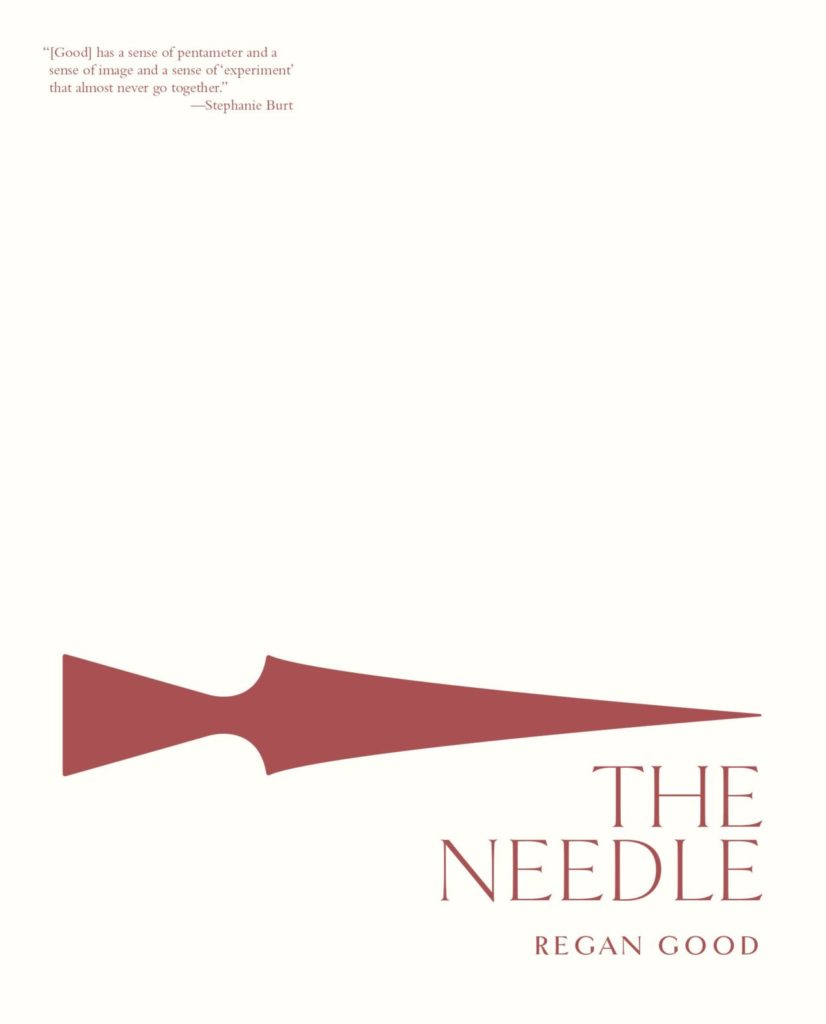The Crux of Its Divining
by Tom Edward Phillips | Contributing Writer

The Needle
Regan Good
Harry Tankoos Books, 2020
Opening with a striking poem about a piano burning on a beach before being subsumed into the waters where ‘Tides still breathed through the strings, like an underwater harp,” Regan Good’s latest collection shows her to possess, not only a sharp eye and ear, but also a highly distinctive voice. We might sense this from the titles of individual poems alone—“The Sailor Cannot See The North, But He Knows The Needle Can” (taken from a letter by Emily Dickinson), say, or “Reverse Commute Through Grand Central: All Doors Open At Westport”—but this voice emerges, above all, in the sinewy linguistic threads weaving through her poetry and the fluent patterns of rhythm and sound that, to some extent, recall those deployed by Seamus Heaney or, perhaps, even Gerard Manley Hopkins.
In “Spring Song In The Fallen Catholic’s Yard, Westport, Connecticut,” for example, she remembers how
In the pond, amphibian eggs stuck to the slimed stick,
clumped in the crux of its divining fork,
clear clusters jerking with tadpole life . . .
and how
Beguiled by the token, spring snatches and blunts,
turning seeds evenly in their holes, baking
them in pockets of gaseous glee.
The language here clearly reflects the sheer physicality of the moment itself, while at the same time enabling us to venture our own questions in regard to a spring that “snatches and blunts,” or a line or two later, “The wait” which “deforms, / elongates white stems of albino alkaloid straw.” In short, we’re not given everything on a plate—who’d want that anyway?—but the dextrous play of sound and sense offer us a relationship with experiences and observations that goes beyond mere recognition—and transcends that positive yet insubstantial shrug which comes in the form of “Oh, yes, that’s well put.”
“Spring Song . . .” ends with an uplift—“Suddenly the fragrance of wood violets! Is this the scent of hope?”—and elsewhere we find a similar discovery of something gained from acutely observed moments of dissolution. Perhaps one of the most finely worked and thought-provoking poems here, “All The Ships Have Come And Gone,” begins:
By the tidal inlet, slime stains the waterwalls
an aberrant, abnormal green,
a mossy smear of chemical phosphorous
(disseminated by widemouthed industrial drains)
in which tiny plants take residence
—clover leafs with minuscule hairy roots—
sending clear sucking tubes into the jellymass.
And yet even here, despite the all-too-evident signs of pollution and the language’s effects underpinning a sense of the grotesque in that “aberrant, abnormal green” and “mossy smear,” Good finds those “clover leafs” and, later, a swan that “nibbles at the mossy walls,” signs of a natural world enduring amid those “industrial drains” and “human waste.”
Poems like “The Nyala Farms, Westport, Connecticut,” which explores the impact of corporate intrusions on her primal landscapes and refers to “a Randian hedge fund called Bridgewater Associates that has taken over my hometown,” or “The Deer Pit In An Iowa County, Twenty-Five Years Ago,” with its images of dead and shot deer and the chilling image of “Already a hunter mistaking a person for a deer,” further affirm this sense of Good’s sharp eye for where and how humans have and will continue to inflict wounds on the planet.
At the same time, however, there’s a sense of endurance, resilience in the face of such flux, and poems which find and retrieve what she memorably calls “a feeling rare as a St. Kilda wren” when “A wind comes from the leaves” and prompts her to ask “Is this the sun again?”
—
Tom Edward Phillips is a UK-born writer, translator, and lecturer now living in Sofia, Bulgaria. His poetry has appeared in a wide variety of journals and anthologies, as well as a number of pamphlets and full-length collections. His three most recent pamphlets—And Now Rousing Music (2020), Foreign in Europe (2019) and Present Continuous (2018)—are all available to read online via http://recreationground.blogspot.com/. He has translated work by many leading contemporary Bulgarian poets into English and currently teaches creative writing at the University of Sofia St Kliment Ohridski.
